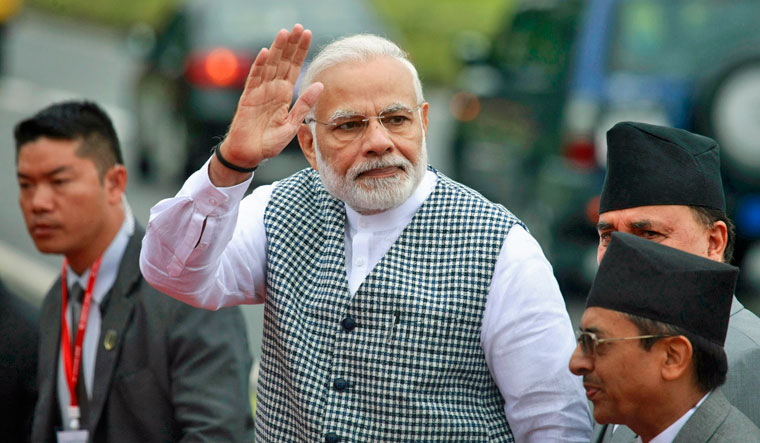Prime Minister Narendra Modi was given a red carpet welcome at Kathmandu as he arrived in the Himalayan state to attend the fourth BIMSTEC summit on Thursday. Modi, who had really taken the lead to revive the grouping—on the sidelines of the BRICS summit, will be keen to use the opportunity to recalibrate his neighbourhood policy. With China and Pakistan out of the mix, India has a real opportunity to reach out and make an impact.
“We not only have diplomatic relations with all BIMSTEC countries, but we are strongly connected by civilisation, history, art, language and cuisine,'' said Modi at the plenary session of the BIMSTEC summit. He has also promised 30 scholarships for BIMSTEC students at the Nalanda University and short-term courses on various subjects.
India will have to go beyond history for the future to really make use of this opportunity. As Nepal Prime Minister K.P. Oli put it: “the world is watching'' because as a region “with 1.6 billion people, representing 22 per cent of world population and a combined GDP of $2.8 trillion, our vision, our commitment and action will have an impact on global political and economic order.” The focus will be on greater trade, greater connectivity and a need to deal with common challenges like natural disasters together and drug trafficking and terrorism.
SAARC may have failed to become an economic powerhub, but BIMSTEC seems to have the potential with less political friction to make it work. But the question is, can it? India has scheduled war games with the BIMSTEC countries later next month.
So far, the Modi government's neighbourhood first policy has had mixed results. With an exception of Thailand, which is part of BIMSTEC—where India has had no problems, the relationship the other members Bangladesh, Myanmar, Sri Lanka, Bhutan and Nepal has been choppy. The National Record of Citizenship has been an issue with Bangladesh. While Sheikh Hasina and the Modi government have shared a warm relationship, the NRC has raised alarm bells in Bangladesh. The meeting with Sheikh Hasina, on the sidelines of the summit, will no doubt give Modi another chance to allay her fears. Nepal and India may have mended their fences, but the equation between the two have changed. China has made in roads into Sri Lanka. And India will have to think of out of the box to exploit the potential of this grouping.


